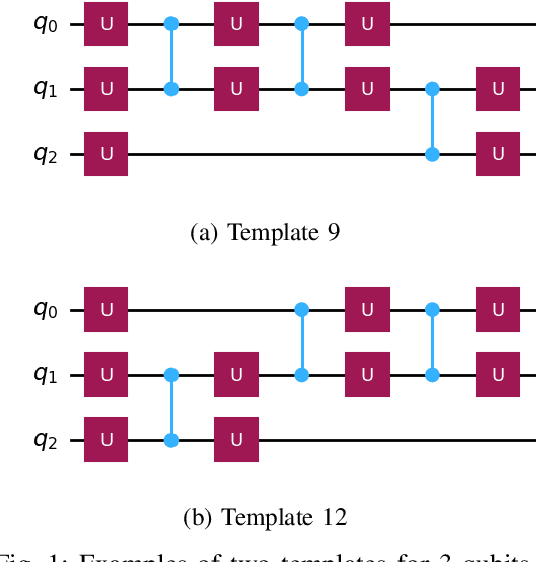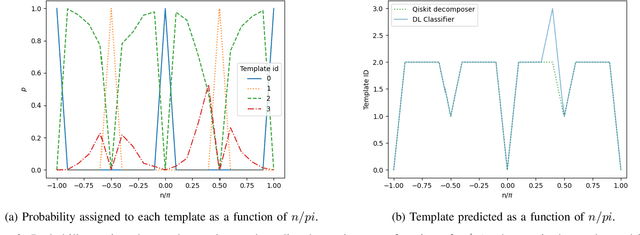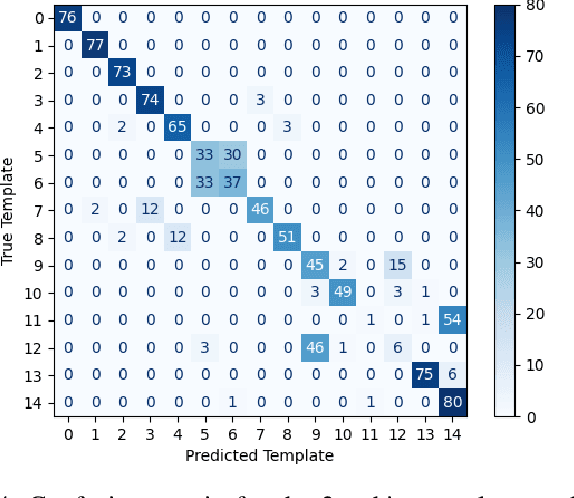Victor Villar
AI Methods for Permutation Circuit Synthesis Across Generic Topologies
Sep 19, 2025Abstract:This paper investigates artificial intelligence (AI) methodologies for the synthesis and transpilation of permutation circuits across generic topologies. Our approach uses Reinforcement Learning (RL) techniques to achieve near-optimal synthesis of permutation circuits up to 25 qubits. Rather than developing specialized models for individual topologies, we train a foundational model on a generic rectangular lattice, and employ masking mechanisms to dynamically select subsets of topologies during the synthesis. This enables the synthesis of permutation circuits on any topology that can be embedded within the rectangular lattice, without the need to re-train the model. In this paper we show results for 5x5 lattice and compare them to previous AI topology-oriented models and classical methods, showing that they outperform classical heuristics, and match previous specialized AI models, and performs synthesis even for topologies that were not seen during training. We further show that the model can be fine tuned to strengthen the performance for selected topologies of interest. This methodology allows a single trained model to efficiently synthesize circuits across diverse topologies, allowing its practical integration into transpilation workflows.
Pauli Network Circuit Synthesis with Reinforcement Learning
Mar 18, 2025



Abstract:We introduce a Reinforcement Learning (RL)-based method for re-synthesis of quantum circuits containing arbitrary Pauli rotations alongside Clifford operations. By collapsing each sub-block to a compact representation and then synthesizing it step-by-step through a learned heuristic, we obtain circuits that are both shorter and compliant with hardware connectivity constraints. We find that the method is fast enough and good enough to work as an optimization procedure: in direct comparisons on 6-qubit random Pauli Networks against state-of-the-art heuristic methods, our RL approach yields over 2x reduction in two-qubit gate count, while executing in under 10 milliseconds per circuit. We further integrate the method into a collect-and-re-synthesize pipeline, applied as a Qiskit transpiler pass, where we observe average improvements of 20% in two-qubit gate count and depth, reaching up to 60% for many instances, across the Benchpress benchmark. These results highlight the potential of RL-driven synthesis to significantly improve circuit quality in realistic, large-scale quantum transpilation workloads.
AI methods for approximate compiling of unitaries
Jul 30, 2024



Abstract:This paper explores artificial intelligence (AI) methods for the approximate compiling of unitaries, focusing on the use of fixed two-qubit gates and arbitrary single-qubit rotations typical in superconducting hardware. Our approach involves three main stages: identifying an initial template that approximates the target unitary, predicting initial parameters for this template, and refining these parameters to maximize the fidelity of the circuit. We propose AI-driven approaches for the first two stages, with a deep learning model that suggests initial templates and an autoencoder-like model that suggests parameter values, which are refined through gradient descent to achieve the desired fidelity. We demonstrate the method on 2 and 3-qubit unitaries, showcasing promising improvements over exhaustive search and random parameter initialization. The results highlight the potential of AI to enhance the transpiling process, supporting more efficient quantum computations on current and future quantum hardware.
Practical and efficient quantum circuit synthesis and transpiling with Reinforcement Learning
May 21, 2024Abstract:This paper demonstrates the integration of Reinforcement Learning (RL) into quantum transpiling workflows, significantly enhancing the synthesis and routing of quantum circuits. By employing RL, we achieve near-optimal synthesis of Linear Function, Clifford, and Permutation circuits, up to 9, 11 and 65 qubits respectively, while being compatible with native device instruction sets and connectivity constraints, and orders of magnitude faster than optimization methods such as SAT solvers. We also achieve significant reductions in two-qubit gate depth and count for circuit routing up to 133 qubits with respect to other routing heuristics such as SABRE. We find the method to be efficient enough to be useful in practice in typical quantum transpiling pipelines. Our results set the stage for further AI-powered enhancements of quantum computing workflows.
 Add to Chrome
Add to Chrome Add to Firefox
Add to Firefox Add to Edge
Add to Edge